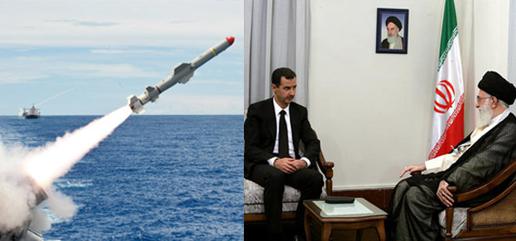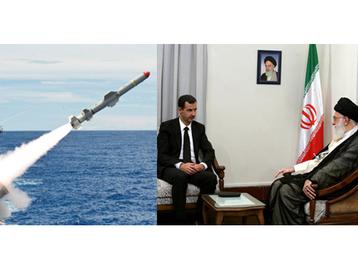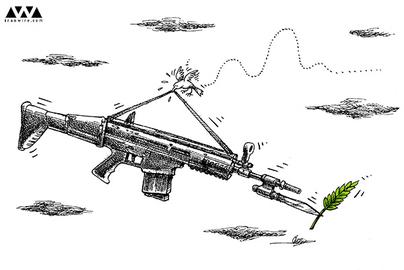
Congress will return to Washington next week to vote on military action in Syria. Ahead of that vote, the Washington establishment, from journalists to officials to pundits, are bitterly divided as to whether intervention will advance vital American interests. One argument put forward by influential analysts who oppose military strikes is that the sort of action being proposed will not fundamentally alter the course of the civil war. We turn to Andrew Tabler, a fellow at the Washington Institute for Near East policy, to discuss this and other questions, in the lead up to America's likely military action. Tabler spent years living and working in Syria, and dealt closely with senior Syrian officials. He has emerged as one of the key voices in Washington advocating an America strike on Syria as a way to pressure Iran into compromising on its nuclear program. In Tabler's calculations, American military action will require Iran to become more involved in Syria, a move that would cost Iran dearly and encourage Tehran to rethink its own nuclear aspirations.
When Congress votes next week on military action, what sort of intervention is on the table, what scale?
There will be a cruise and tomahawk missiles strikes as well as some other air strikes, possibly on a Syrian regime and military targets inside of Syrian territory. Also combined with some indirect intervention that involves a greater support and a plan for the Syrian opposition, which is part of the carry over of our previous policy. Those are the areas of involvement.
Will intervention on that limited scale fundamentally change the outcome of the civil war, or ensure that chemical weapons are not used again?
It is designed to do that. Assad usually responds to the hard definition of red lines. For example, if you look at the situation regarding Israel’s enforcement of red lines on Syria, the only way he stops doing something is if there is a direct destruction of the unit in question or the supply in question, and they lay down that red line very clearly. And I think that’s what we we'll probably be seeing in the coming days.
What are US interests in Syria? What is a good scenario, from an American perspective?
For Assad to collapse tomorrow and the Syrian opposition coalition to take power, but that’s not going to happen. The truth is, no matter what the US does in the next few days the Assad regime or part of it, will hold onto the country, or part of the country, for a while, absent a major change in US policy, and in other areas of the country the opposition is still disorganized. That I think is likely going to be the case for the feasible future.
How worried is the United States about rise of Qaeda-linked Jihadis in Syria?
There is lot of concern, two concerns in particular, that I call a convergence threats. On one hand you have an Assad regime more dependent than ever on support from Tehran financially, militarily, advising, combined with the same support from Hezbullah, direct support, ruling over 40 percent of the country. Then in the other 40 percent of the country you have the opposition, and among their ranks are extremists of the worst kind. So it’s a combination of two threats.
Is there a feeling in Washington that Saudi and Qatar are playing the right role in this war, do they share American objectives? They seem to be exploiting the civil war in Syria to advance a very short-sighted, dangerous agenda that doesn't necessarily dovetail with US interests.
We share the short term interest of bringing down the Assad regime, replacing it with something else. We do not share the long term interest in the terms, the Qataris would be much more happy with a Muslim Brotherhood government in Syria and the Saudis will be happy with a moderate Islamist government of some type, whether it is Muslim Brotherhood or Salafist, or both, I don’t know. So there is not agreement on those long term interests. The United States does not support that, it supports a secular government in Syria.
Are Qatar and Saudi Arabia motivated mainly by sectarian interests, or this about a strategic countering of Iran's influence that also has a sectarian dimension?
Well there is a sectarian dimension to this because there is a sectarian dimension to the core to the Assad regime and it’s killing lots of people in the opposition. Many if not the majority of whom are Sunni, so that’s bound to cause that group of Sunnis to fight back the regime. That’s been the way the conflict developed. So there is that and Saudi Arabia, Qatar and other Arab countries are known to support Sunnis in other countries.
But there are also other interests, Syria is important for one important reason, and that's geography. It’s the reason why Iran holds on to it, it’s why people deal with it, it’s the reason why the United States dealt with Assad over time. It’s just the row house in the middle of the block, it’s important. And for Qatar and for Saudi Arabia, you can built pipe lines across it. And that’s the reason why you saw the recent offer by Prince Bandar to the Russians about keeping Saudi Arabian outside of the European market. Well that involves the pipeline will go through Syria through Turkey to Europe. And that will also presumably have carried Qatari gas as well. So there are real strategic interests. But there is also the overall thing about Iranian influence.
Is there a worry in Washington that this lack of resolve, this leisurely lead-up to military action, is sending the wrong signal to Iran?
Yes, quite a lot. There a couple of notions. One of them is that if Iran is more relaxed in the Levant, or more relaxed overall, it makes harder choices on its nuclear program. It doesn’t feel like it has to go nuclear. And there is another point of view that holds that individuals and nations don't make hard choices unless they have to. And usually when you have to make tough choices is when you are not doing so well. And I think now, that’s what we are looking at. People realize that it would be better if the Iranians were not doing so well.
How is the US calculating that Iran will react?
I think they think that Iran will continue to support the Assad regime, but I don’t think that they think Iran will order a strike on Israel or a strike on American interests in the Gulf as a result of enforcing a red line with Assad on chemical weapons.
Are there concerns that Iran might seek to respond by activating Hezbullah?
There are, but the whole northern front of Israel is locked and loaded, so good luck with that.
Is the view in Washington that Hezbullah and Iran are acting as one in Syria, and that Hezbullah decision has been totally superseded by Tehran?
I think it’s clear to everyone in Washington that the Syrian regime was only able to go on the offensive with monetary support from the Iranian regime, with advising from the Revolutionary Guards, and with direct intervention from Hezbullah troops. And even that didn’t go that well. It took a lot of Hezbullah warriors to take Qusayr. So what we do know is that the Assad regime is going to be more beholden to Tehran than ever before. And that’s not good for U.S. policy objectives, and it brings the Iranian threat more to the shores of the Mediterranean.
Did Rafsanjani's recent comments blaming Assad for the chemical weapons attack register in Washington as reflective of a split within the Iranian establishment?
Yes, it was duly noted, and we know that Iranians are sensitive about the issue of gas because the Iraqis used it on Iranian forces. But everybody in Washington also knows that it’s not the president who runs the country in Iran, it’s the Ayatollah. It doesn’t mean that it is the only force but it is to us the determining one, so it’s kind of a mixed bag.
Does the US have a post-Assad plan?
It's my assessment and that of others that he's not going to collapse, and will hold on to a portion of the country until, if and when, American policy changes.
Will the strikes be carried out with the intention of disrupting Iran's supply route to Hezbullah, through Syria? Will the Damascus airport be involved?
Yes, it could be.
visit the accountability section
In this section of Iran Wire, you can contact the officials and launch your campaign for various problems

























comments